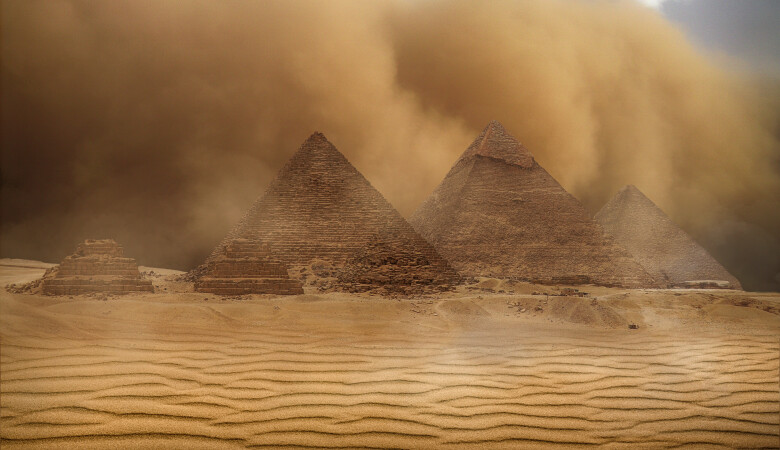God Unveils His New Universe (Isaiah Sermon 78 of 80)
February 12, 2017 | Andy Davis
Isaiah 65:17-25
Second Coming of Christ, The Millennium, Heaven
Andy Davis preaches a verse-by-verse expository sermon on Isaiah 65:17-25. The main subject of the sermon is the promise of the New Heaven and Earth and the time of Christ's coming.
- SERMON TRANSCRIPT -
Well, this morning, you've already heard the text that Chris read. We're going to look at one of the most provocative and powerful sections of Isaiah's prophecy, the vision he had concerning the future universe as recreated in Christ, the new Heavens and the new Earth that are coming. The aspects of it here seem like it might be discussing elements of what theologians call the Millennium or the Millennial kingdom. And so we're going to have to look at that as well and try to understand it. No matter what we end up believing this passage is the truth and tells us in some kind of language of a glorious future that should fill all of us with hope, and joy. And that's the outcome, the ultimate outcome. My desire is to create in each one of you who listen to me today a forward-looking perspective, that you're going to be looking forward to what is coming. Colossians Chapter 3, verse 1-4 says, "Since then, we have been raised with Christ. Set your hearts on things above, where Christ is seated at the right hand of God. Set your minds on things above, not on earthly things for you died and your life is now hidden with Christ in God. When Christ who is your life appears, then you also will appear with Him in glory." So, set your minds on things above, and clearly in that text, things to come. When Christ appears, the Second Coming.
Hebrews 11:10 says that Abraham was "looking forward to the city with foundations, whose architect and builder is God." Looking forward, that's a faith perspective. Again, 2 Peter 3:13, it says, "In keeping with his promise, we are looking forward to a new Heaven and a new Earth, the home of righteousness." So this looking forward, this forward-looking perspective, can only be done by faith, really can only be done in Christianity. We have a supernatural religion based on prophecies given to us by the eternal mind of God. And there's no other religion in the world that has this, predictive prophecy of what is yet to come. And so only by revelation, only by the unveiling that Scripture does, can we see both the invisible God and the invisible world that he is promising us.
Faith is the eyesight of the soul, and God is the revealer of the unseen. Faith comes from hearing the Word. So my desire is that your faith will rise from an exposition of Isaiah 60:5, and your eyesight will get clearer, and that you will see the unseen, the invisible, the invisible God and the invisible coming worlds.
I. Dreams of a Perfect World
Now we all have, I believe, within our hearts, dreams of a perfect world. Throughout recorded history, mankind has imagined perfect world, perfect societies. This is all over the world. People do this. Since the fall of Adam into sin, the world has been cursed. In Genesis 3, to Adam God said, "Because you listen to your wife and ate from the tree about which I commanded you, you must not eat of it, cursed is the ground because of you. Through painful toil, you will eat of it all the days of your life. It will produce thorns and thistles for you, and you will eat the plants of the field. By the sweat of your brow, you will eat your food until you return to the ground, since from it you were taken. For dust you are, and to dust you will return."
So that's the curse. So both the Earth itself and human labor on the Earth was cursed there. And the struggle for survival was on, the bitter struggle for survival was on, and it is bitter. Life on Earth became an instant grief to the human race. Ecclesiastes 1:2-4, "Vanity of vanities... Vanity of vanities. All is vanity. What does man gain by all the toil at which he toils under the sun? A generation comes, and a generation goes, but the Earth remains forever." Sense of emptiness, of vanity to our labors in our life, doesn't mean anything. And creation itself has been groaning under this, the burden of this curse. Death has been rampant, constantly threatened, both for man and for beast. Ecclesiastes 3:19-20. It says, "Man's fate is like that of the animals. The same fate awaits them both. As one dies, so dies the other. All have the same breath. Man has no advantage over the animal. Everything is meaningless. All go back to the same place. All come from dust, and to dust, all return." Ecclesiastes 3.
Now, human hearts and therefore human society, was corrupted to the core by sin, by the sin of Adam. We are corrupted in our hearts. Adam and Eve, as soon as they ate from the tree, their eyes were open. They realized they were naked, and they hid from each other in shame and they made fig leaves to cover their shame. It wasn't long after that that Cain killed his brother Abel, the very next chapter. So we see an expansion of sin. And by the time of Noah, the contagion of sin had spread to epic levels. All over the world, all the thoughts of human hearts were only evil all the time. And the link between human sin and nature's groaning is clearest in the flood. All the air-breathing animals that were not on the ark were killed, swept away because of human sin.
Man sinned, animals died. So, this lamenting, this groaning pain-filled seemingly meaningless existence seems so wrong to us, doesn't it? Something's wrong here. We have a sense of a perfect world I believe, imprinted in our souls, like paradise in our souls. And mankind has always yearned for it and imagined it. Authors and poets, cult leaders and statesmen, conquerors and song writers, scientists and architects have all yearned for a paradise, have used their skills to kind of describe it if they can, some kind of a utopia that could be ushered in, a golden age free from this frustrating curse. Plato's Republic written around 370 BC, is one of the oldest efforts in human literature, to capture this desire for a golden age, a perfect society. About 150 years before Christ, a Greek merchant, Iambulus, wrote a book called Islands Of The Sun describing a perfect society in some distant island, in the Eastern sea.
In the year 421, after Christ, a Chinese writer named Tao Yuanming wrote a fable called the Peach Blossom Spring in which a fisherman accidentally sailed up a river into a forest made entirely of blossoming peach trees. The river, led to a grotto with a narrow passage way through which he was able to squeeze and there he found a village, with animals and people of all ages. The villagers were shocked to see him but they were friendly. It was an ideal society cut-off from the outside world. He left and marked his path with signs so he could find his way back, but he could never find it again. A yearning for a perfect world, a perfect society.
In 1516, Sir Thomas More in England, coined the term utopia by writing a book with that same name, the word, literally means no place. And it describes an island in the recently discovered new world, Columbus had discovered the new world just a few decades before that. And in that island there was a perfect society. Robinson Crusoe, Gulliver's Travels, HG Wells kind of expands it out to other planets.
So we're going to be moving through the cosmos finding a planet with a perfect society. The quest goes on and on. It's deeply rooted in our hearts. Ecclesiastes 3:11 says, "God has set eternity in the hearts of men," but I think he's also set paradise there too, a sense of a perfect world, free from this curse. However, no vision is better than the Bible's, amen? We just heard it sung, we've read it again and again in Revelation 21, and 22, and when we come to Isaiah 65:17-25, we come to Isaiah's vision of that future perfect world. God alone has, if I could use this word, the imagination and the mental power to create a perfect world, in terms that we understand. God alone can work out all the details of that world in a way most glorifying to him and most perfectly satisfying to us. The Bible actually does describe a perfect ideal world, in which people live in harmony with nature and with each other. And it's coming. It's not just an idea, it's actually a prophecy, it's coming. Many passages in this book of Isaiah describe it so also does the book of Revelation.
The Power of Predictive Prophecy
So we come to Isaiah 65:17:25, and we come to an unveiling of God's perfect future world. "Behold," says God, " Behold," right at the beginning, "Behold me, and my perfect world." And then the questions that all Christians struggle with in understanding not just this perfect world, but we are so curious, "I want to know the details," and friends the details are going to probably just kill us as I walk through it in this text, but we'll do the best that we can. I was talking to somebody recently about this sermon, I have been working on this sermon for two months that's why it's, you know, an hour and a half long, it just keeps going on and on and on. It actually was going to be two sermons in one, we were going to do some Isaiah 65. We're going to spend a bunch of time in Revelation 20, and this morning I said, "Okay, we're not doing that." I think all of us, everyone, not just some of us, all of us are like, and please forgive this geeky illustration, but we're like circuit breakers. We can only take so much current flowing through and then we trip over.
And the amount of information that you all... That we all can handle is limited. And so I'm going to do my best to make it clear, to try to just walk through Isaiah 65 and explain these words, and to try to explain, especially verse 17, and verse 20 and how hard they are to harmonize and to describe the Millennium whatever that means, and to do it in a way that helps all of us. Now, as I said, what we're doing here as Christians is something that we're the only ones that can do, it's the only religion in the world they can do this. We're looking at predictive prophecy. We're looking at words written by God that tells us what's going to come, what's coming in the future. God again and again claims to be the only one that can do this. Isaiah 46:9-10, he says, "I am God and there is no other. I am God and there is none like me, I make known [listen to this] the end from the beginning, from ancient times, what is still to come. I say my purpose will stand and I will do all that I please." So God has pleased to think of the end and now he is sovereignly going to bring it about.
Questions of the Millennium!
So we come to this and the questions of the millennium. Isaiah 65 is going to bring us to ask some of the most exciting and debated questions there are in Christian eschatology, the study of the end of the world, that's what eschatology means. Age old debates about the possibility of a literal thousand-year reign of Christ on earth after his second coming, the possibility of a greatly enhanced life on earth, something that's free, essentially, for the most part, from the curses that we labor under, in which the effects of sin and death are greatly reduced though not totally removed. That's the essence of the Millennium verses the Eternal State. These questions will come up not naturally from Isaiah 65, but from the Bible as a whole, with Isaiah 65:17-25 as a key reference text. If there will be a literal thousand-year reign of Christ on earth before the Eternal State, the new heavens and the new earth, and if life in that Millennial kingdom, is described anywhere in the Bible, it is almost certainly described in this text here.
Now that's a lot of careful speaking, isn't it? If and if. But if there is going to be a Millennium it's described here. Either way, either whether there's going to be a Millennium or not, Isaiah 65:17-25 is legitimate prophecy for us as Christians. It's either going to come true in the Millennium or in the Eternal State, either way we get it and we're blessed and we should be happy and filled with hope.
Now, I have a certain level of uncertainty in this, I suppose you can already tell. It's not a good thing. No topic in theology that I've studied for decades has so eluded final resolution as this one for me. I stand before you today like a theological ping pong ball. And you might ask, "What side are you on today?" Well, today I'm essentially amillennial. I don't know if I will be at the end of this sermon. Something might happen in the middle, and some new aspect of 1 Corinthians 15 or Revelation 20 or something will hit me and I'll ping back again.
This is bad, this is not a good thing, this is a bad thing. Howard Hendricks said to all preachers, "A mist in the pulpit is a fog in the pew." Now, we have decided with our worship services to avoid smoke machines, we don't want the fog machine wafting from the front across the congregation, so, we walked out in a total fog. I don't want that, but I'm going to do the best that I can.
II. Isaiah 65: God Says “Behold Me... and My New Universe!”
First let's get a little context in Isaiah 65, this is my second sermon in this chapter, I preached the first last week and we followed the keyword as you remember, behold, behold, that word of unveiling. And I gave you a four-part outline to the whole chapter. We did the first three parts last week, now the fourth. So it began with the word behold, that archaic word, that unveiling word. "Behold me," says God, God's humble self-revelation to Gentiles, remember we peered through the Book of Romans, the Apostle Paul said, "This is the Gentiles." Isaiah 65:1, "I said behold me, behold me, unto a nation that was not called by my name." Those are the Gentiles. So God stands in the gospel before Gentile nations around the world and says, "Behold me, look at me," and that's through Christ, through the Gospel.
Secondly, "Behold my judgments," verses 2-7, God says, "Behold it is written before me, I will not keep silent, I will repay." And there the context Paul tells us is unbelieving Jews who've had the rich blessings of the Mosaic covenant, but who are Pagans, essentially pagans, living a Pagan life.
And then thirdly, we saw, behold my servant singing while the wicked are shamed and excluded. And so God speaks to the wicked as outsiders telling them the blessings that he's going to give to his servants.
Verses 13 and 14, "Behold my servants shall eat but you shall go hungry, behold my servants shall drink but you shall be thirsty, behold my servants shall rejoice but you shall be put to shame, behold my servants shall sing for gladness of heart, but you shall cry out for pain of heart and wail for breaking of spirit."
And he does this now in the text to warn outsiders to stop being outsiders, but to come in while there is time so that they can feast at the end of the world.
III. Walking Through the Text, Weighing Its Promises
But now, we look to verses 17 and following, "Behold, I will create a new heavens and a new earth." And then again in verse 18, "For behold, I create Jerusalem to be a delight and its people a joy." So those are last two beholds. So there's this unveiling of the new heaven and the new earth, and an unveiling of the new Jerusalem. Let's just walk through the text and let's just weigh its promises. What is described here is an idyllic experience of rich blessing, never yet seen on this sin-cursed earth. This was not fulfilled after the exile to Babylon ended, nothing like this happened at all. So this is as yet unfulfilled, we are still waiting for this. This is a future prophecy.
Listen to the text again verse 17 and following, "'Behold, I will create new heavens and a new earth. The former things will not be remembered, nor will they come to mind. But be glad and rejoice forever in what I will create, for behold, I will create Jerusalem to be a delight and its people a joy. I will rejoice over Jerusalem and take delight in my people; the sound of weeping and of crying will be heard in it no more. Never again will there be in it an infant who lives but a few days, or an old man who does not live out his years; he who dies at a hundred will be thought a mere youth; he who fails to reach a hundred will be considered accursed. They will build houses and dwell in them; they will plant vineyards and eat their fruit. No longer will they build houses and others live in them, or plant and others eat. For as the days of a tree, so will be the days of my people; my chosen ones will long enjoy the works of their hands. They will not toil in vain or bear children doomed to misfortune; for they will be a people blessed by the LORD, they and their descendants with them. Before they call I will answer; while they are still speaking I will hear. The wolf and the lamb will feed together, and the lion will eat straw like the ox, but dust will be the serpent's food. They will neither harm nor destroy on all my holy mountain,' says the LORD."
Alright, let's look at key points, verse 17, God declares that he will create a new heavens and a new earth. The future creative work of God similar to Genesis 1, "In the beginning God created the heavens and the earth," but greater, better. It will be so radically different it will drive out all the thoughts of the old world so radically improved. Verse 17, "For behold I will create new heavens and a new Earth. The former things shall not be remembered neither shall they come to mind."
Notice that it begins with the words, "For behold." Verse 17, the word "for" which doesn't show up in some other translations but all of those that are precise have the word "for," it causes us to look back at least one verse, verse 16, alright, and verse 16, it says, "Whoever invokes a blessing in the land will do so by the God of truth. He who takes an oath in the land will swear by the God of truth, for the past troubles will be forgotten and hidden from my eyes, for behold, I will create a new Heavens and a new Earth and the former things will not be remembered."
So that's the whole thing. You're not going to remember the past things, all of the past sorrows and grief. Now, as we read this obviously Revelation 21:1-4, comes to mind. There it says, "Then I saw a new heavens and a new earth, for the first heavens and the first Earth had passed away, and there was no longer any sea. I saw the holy city, the new Jerusalem coming down out of heaven from God, prepared as a bride beautifully dressed for her husband, and I heard a loud voice from the throne saying, now the dwelling of God is with men and He will live with them, and they will be his people and God Himself will be with them and be their God, and He will wipe every tear from their eyes, and there'll be no more death, or mourning, or crying, or pain. For the old order of things has passed away." Do you not see the beautiful harmony there between Revelation 21 and Isaiah 65? They come together.
Now the new heavens and the new earth in Revelation 21 is what most people just simply call heaven. But I think we forget the new earth part. Can I just say this right now? If you vigorously believe, as you should, in a coming physical new earth and a spiritual new heaven that is harmonized in Christ, with the throne of God on that new earth, and you will walk on that new earth in a resurrection body and you are eager for that future world to come, it doesn't make a difference what you believe about the Millennium. It won't affect your missions at all, it won't affect your prayer life at all, it won't make any difference whatsoever in your marriage, in your parenting, in your church membership. None of it matters. The only reason we care is we're trying to be faithful to the text and understand it, "But what... Pastor, you're saying that this actually won't make a difference, your sermon will not be applicable at all." I'm not saying that. I want you to set your mind on eternity, the blessings that are described here could be begun in the Millennium and perfected in heaven. Set your heart on the new heavens and the new earth, that will affect how you live. That will affect your marriage, it will affect your parenting, it will affect your prayer life, it'll affect everything. But the precise difference between the two? It won't matter, if you vigorously believe in a new heavens and new earth, and they are coming. So now you can check out some of these like, "I don't need to wander through the Millennium," stick with me. There's good things yet to come. The new heavens and the new earth in Revelation 21, what most people simply call the Eternal State or heaven, there, clearly all death and misery are gone forever. They're gone. There will be no more death or mourning or crying or pain.
Now, back to Isaiah 65 it says verse 18, it will be a place of eternal joy, where people will have cause to rejoice forever. The naming of the city of Jerusalem and her people is a source of eternal joy. "Behold I will create Jerusalem to be a delight and its people a joy." So it's a place of delight, joy, satisfaction. Verse 19, God declares that he will rejoice over Jerusalem, eternally, and the sounds of weeping and mourning will never be heard in it again. Do you see that in verse 19?
Now we get to verse 20. Let tell you something about verse 20. Verse 20 is one of those amazing moments. You know those trendy expressions like this one, "Wait, what?" You ever heard that one? What is... What happens? What is, "Wait, what?" It's like we're going along and then something happens like, "Wait a second, what just happened?" Verse 20 is like that. It's maybe one of the greatest, "Wait, what," moments in the whole Book of Isaiah. Look what it says, "Never again will there be an infant... " Wait a minute, what? "An infant who lives but a few days or an old man," wait what was that? An old man? "Who does not live out his years. He who dies at 100 will be thought a mere youth and he who fails to reach 100 will be considered accursed." Like, okay, I thought we were in the new heavens and the new earth. That's what verse 17 said, right? Now we've got birth, aging, death and curse? What about Revelation 22:3 which says, "No longer will there be any curse"? What about Mark 12? It says, "When the dead rise, they neither marry nor given in marriage," there's no more procreation, no more infants.
So the seeming existence of birth and death in verse 20 are the very things that makes some people think this must be the Millennium. That's the difference between the Millennium and the Eternal State is the presence of birth, aging and death and sin. And the rest of the chapter tells us the rest of the aspect of the Millennium, a greatly enhanced experience in which your works are blessed and will not be frustrating. You'll build things and they will work out and you'll plant things and you'll get a full harvest. So that's the enriched experience of life. But still, there's birth, aging death and sin. That's the essence of what the Millennium is all about. Verse 21 through 23, it says, "They will build houses and dwell in them. They will plant vineyards and eat their fruit. No longer will they build houses and others live in them, or plants and others eat. For as in the days of a tree, so will be the days of my people. My chosen ones will long enjoy the work of their hands. They will not toil in vain or bear children doomed to misfortune, for they will be a people blessed by the Lord, they and their descendants with them."
This lavish language here, Old Covenant images I think, the blessing of the Earth, the rich harvest, the curse is either completely removed or at least greatly reduced. Verse 22, an unusually long life like the redwood trees, living just centuries old. "As the days of a tree, so will be the days of my people," but trees do die. Even redwoods die. So there's the sense of long life. The overall language as I've said if you're familiar with Old Covenant blessings and curses language, which is in the Book of Deuteronomy and then in the prophets, this is just like it. Agricultural rich blessings. Verse 23, "They will not toil in vain or bear children doomed to misfortune, they will be a people blessed by the Lord, they and their descendants with them."
Verse 24 promises amazing access and intimacy with God. "Before they call I will answer. While they're still speaking I will hear." There's that intimacy with God. And then verse 25, a repeat of earlier language on the amazing supernatural piece that comes on earth by the transformation of animals. So the animals have basically, essentially a different nature, different than what we've known. Look at verse 25, "The wolf and the lamb will feed together and the lion will eat straw like the Ox, the dust will be the serpent's food, they will neither harm nor destroy on all my holy mountain, says the Lord." It reminds us distinctly of Isaiah 11:6-9, which says, this should sound very familiar, "The wolf will live with the lamb, the leopard will lie down with the goat, the calf and the lion and the yearling together and a little child will lead them. The cow will feed with the bear, their young will lie down together and the lion will eat straw like the ox, the infant will play near the hole of the cobra and the young child put his hand into the viper's nest, they will neither harm nor destroy on all my holy mountain for the earth will be full of the knowledge of the Lord, as the waters cover the sea," that's Isaiah 11:6-9, very similar language.
This seems to be talking about an idyllic relationship with the animal kingdom. No more of an adversarial predator-prey type of relationship. Wolves will stop acting like predators against lambs. Leopards will be the same toward goats. Cows will stand side-by-side next to lions, with no fear, the carnivorous destructive nature of the animal kingdom will be changed. What Alfred, Lord Tennyson, called nature red in tooth and claw, all that mindless ripping and shredding that animals do with each other. That seems to be done, gone, even the serpent, the cobra and the viper is transformed from an enemy to a friend, or humbled in some amazing way, the infant has nothing to fear at least. And then in Isaiah 11, there's that universal knowledge. The earth will be filled with the knowledge of the Lord as the waters cover the sea. To sum up it seems that this section of scripture speaks of a stunning level of blessing on earth so great that it has never been seen in the history of the world.
It comes under a title in verse 17 of new heavens and new earth that God will create, it's centered in Jerusalem. It involves such amazing joy that the sounds of mourning will not be heard in it at all, it involves rich agricultural blessing, sowing and reaping, no crop failure at all, building houses, other structures, no destruction at all, work is lavishly therefore blessed and successful. There seemed to be no enemies, no danger, no sorrow but there is birth and death, there are infants there and people live unnaturally long lives. So the combination of the term, new heavens and new earth with the presence of birth and death is problematic for every Christian interpreter of this passage. No one knows what to do with those two things. There's not an interpreter on earth that's totally comfortable with 17 and 20. People try to harmonize as best they can. Now I heard a preacher say years ago, there's not a preacher, on earth that hasn't at least once been tempted to give God advice on how it would have been better for him to have written this text.
So Lord, if you don't mean a Millennium why did you give us verse 20? Can I just make a suggestion? But listen, who has ever given counsel to the Lord, that the Lord should listen to him. God knows exactly what he's doing and he wants us to wrestle and so we wrestle, and do the best we can.
A word about Premillennialism and Evangelicalism
We need a little bit of history about Millennialism, pre-millennialism, evangelicalism just to know where we're at in our context. First of all, what do I mean by the Millennium? The word literally means the 1000 years, 1000 years. Mille is the Latin for 1000, annus, mille, annus 1000 years. That idea comes only in one place, the literal 1000-year citation as such, but what we're talking about here is only found in one place in the whole Bible: Revelation 20, it's no where else. Ideas concerning it are debatably in other texts as we're looking at today, but the Millennium itself is only found in Revelation 20. Now, in the 20th century, biblical Christians fought a battle against modernism or theological liberalism, in which there were severe questions raised about the Bible.
Post-Darwinian evolution and all that, they were just questions raised about the inerrancy of the Bible, the truthfulness of the Bible and that battle was fought, frequently called "The Battle of The Bible" began with the fundamentalists at the beginning of the 20th century. And at that time, DL Moody, other evangelists kind of link themselves together with a certain eschatology involving prophecy. And they basically said, "If you're Evangelical, if you're a Bible believer you're going to believe in the literal 1000-year reign and the premillennial coming. Jesus is going to come back and then the 1000 years, and that's almost a litmus test of whether you believe the Bible or not. Unfortunately, it got linked with other completely vital and valid issues such as the virgin birth, the substitutionary torment of Christ, his bloody death on the cross, his atoning sacrifice for our sins, his bodily resurrection from the dead, his actual working of literal miracles in space and time all of those things were part of the fundamentalist movement, part of biblical conservativism, but premillennialism got woven in there as well, and I think it shouldn't have.
And so it came to the point where if you didn't believe there was going to be a literal 1000-year reign of Christ after the second coming, you didn't believe the Bible. And that is really just not true and it doesn't show much knowledge about history. Some of the most passionate inerrantists passionately committed to every word of the Bible, were amillennial, they didn't believe in a literal reign of Christ, physical reign of Christ on earth in this pattern. So I think we just separate them. People, pastors lose their jobs over this. I hope I'm not going to, I hope we don't have a growing premillennial, kind of faction in the church. I think it's possible to believe every word of the Bible is God's word. But recognize that prophetic literature and apocalyptic literature are hard to interpret. We just do the best we can to interpret them.
III. Could This Be the Millennium?
So, could this be the Millennium? Well, the word 1000 years comes from Revelation 20:1-6, which mentions the 1000-year period, seems after the second coming of Christ, if you take a consecutive order there in which the devil is bound with chains somehow, thrown in a pit and some, if not all, of the saints are resurrected to reign with Christ. After the 1000 years, the devil's set free. That's where it comes from, Revelation 20.
The idea of a period of rich blessing during that time is not found in Revelation 20. You don't get any of that there. It's just the binding of Satan so that he should not deceive the nations anymore and the raising up of souls that were beheaded during the reign of the Antichrist and they are resurrected and reign with Christ for a thousand years. At the end of the 1000 years, the devil is released and apparently he causes trouble again. So in Revelation 19, we have a clear description of the Second Coming of Christ in which Jesus comes back, destroys the beast, the Antichrist and his army, this huge army. Destroys the beast, throws the beast into hell, into the lake of fire. Huge carnage at that point.
Then you got Revelation 20, which is 1000 years. Satan is bound so he cannot deceive the nations. Martyrs slain by the beast are raised from the dead and sit on thrones and reign with Christ for a thousand years. At the end of the thousand years, Satan is released from his prison. He goes once again on the Earth and deceives people. Gathers them for one final battle. The evil army of rebels is massed and marches against the city of God's people, but God destroys them with fire from heaven. Then at last, the devil is cast into the lake of fire to be tormented forever. After that comes the Great White Throne Judgment in which all human beings that have ever lived are judged by the books of God. Everyone whose name is not found written in the Lamb's Book of Life is thrown into the lake of fire. Revelation 20.
Then Revelation 21, you heard sung so beautifully for us today. That's the New Heaven and the New Earth. I've already read it. Descends from heaven, you have the Eternal State. Revelation 21 and 22 seems to be heaven, the Eternal State. So the sequence is important for premillennialists. They think first the Second Coming in Revelation 19, big battle, Second Coming. Then the 1000 years, that's the premillennial. Then the eternal state. Alright.
The Case For Premillennialism
Why do premillennialists have a good case? What are arguments for it? Why do I act like a ping pong ball, back and forth? Alright. Well, the sequence of chapters in Revelation 19, 20, and 21 seems pretty weighty. And it was very weighty for a counselor of mine who is a teacher at Southern Seminary who I asked advice on this when I had to write this chapter or commentary. And he had switched from being premillennial to amillennial in the three years that I had talked to him. That was not helpful. I was very disappointed. I wanted some premillennial help and he said, "Sorry. I can't help you. I'm an amillennial now." Maybe he switched back in the last month. I don't know. But I had to write the chapter. So the sequence is determined if he told me that. And he said it's first, the Second Coming, Revelation 19, then the 1000 years, and then you've got the Eternal State. Secondly, the binding of Satan.
So apparently, he has no ability to roam or to deceive the nations is troublesome for amillennialists. because we know that Satan is very active on planet Earth. It says in 1 Peter 5, "Be self-controlled and alert. Your enemy, the devil, prowls around like a roaring lion seeking someone to devour." Seems like he is free to roam, free to deceive, free to tear people apart. So it seems like the vigorous binding that's described, that is the essence of the 1000 years there, is not happening now, so it must be in the future.
Also, the Millennium seems to be the best way to understand Isaiah 65:20. I don't know how else to... What do you do with this incredibly, richly blessed world in which there's birth, life and death? I don't know. If there's not going to be a Millennium, I don't know what to do exactly with those words.
And then one final argument for premillennialism is, it seems to make sense big picture. Redemptive history. What was it all about? You know what I think it was all about? At the garden, the human race through Adam and Eve wanted an education. Do you remember? It was the tree of the knowledge of good and evil. So we wanted an education in evil. Well, we've gotten one. And what's it been like? At every level of redemptive history, I'm not a dispensationalist, but at every unfolding of God's redemptive history, as more blessings have been poured out on His people, sin has stubbornly remained and made it difficult, including right now. Do you know what I mean? We have Pentecost blessings, we have the Indwelling Spirit, we're adopted as sons and daughters, and still we wrestle every day with sin. And it's like kind of like the final step of that drama is Jesus physically reigning on Earth, having already come and all that and still there's sin. It makes sense, doesn't mean it's true, but it does make sense.
The Case For Amillennialism
What about amillennialism? First of all, amillennialism is a misnomer. It means like there's no Millennium. Amillennials don't believe that there is no Millennium. It's just that it's a symbolic number in the Book of Revelation. 10 cubed. 10 times 10 times 10. There's a lot of this cubing thing. I'm about to preach through the Book of Revelation all the way through to the end. So I've got a long time to figure out what I believe about Revelation 20, so you can pray for me. Also, I want you to know this is the very topic I'll be discussing on Wednesday night at 6:30 up in the Upper Room in Acts. We're right here in our eschatology study, Millennium. So come and argue with me, debate with me, whatever you'd like to do. That's a good format for that.
Amillennialists don't believe there's no 1000-year binding of Satan. We just think the binding is going on now in a limited sense. It's specific. He's bound so that he cannot deceive the nations to the end that they would mass together and to attack the people of God wholesale and try to destroy them. That seems to be the way the binding is. Or you could say he's not able to deceive the elect of the nations concerning Christ. When Jesus came in Matthew 12, he's talking about driving out demons. Remember that? And they said it's by Beelzebub that he drives out demons. How can Satan drive out Satan?
You want to know what's really going on here? Matthew 12:29. He says, "How can anyone enter a strong man's house and carry off his possessions unless he first ties up the strong man. Then he can rob his house." So that's a huge verse for amillennialists. They're saying the binding happened at the First Coming of Christ so that he cannot deceive the elect of the nations and believe in Jesus. It's not incredibly convincing when you read Revelation 20, but it's at least a possibility. Another reason for amillennialism. It's just the simplest answer for everything. Ever heard of Occam's rule? Just choose the simplest answer. Alright. The next thing that happens after escalating tribulation and the Antichrist is the Second Coming of Christ, all of Jesus' enemies are destroyed, all of his elect are resurrected, judgement happens then an Eternal State.
For me probably the weightiest reason why I believe that amillennialism is the way to go is because it says in 1 Corinthians 15, that at the second coming of Christ He will destroy all his enemies not some of them, and the last enemy to be destroyed is what? Death, death. So after his second coming, there can be no death. I think that's a very strong argument.
Sam Storms who's probably the most articulate advocate of this position said, that if you're a premillennialist there are several things with which you have to reckon. Number one, you must necessarily believe that physical death will continue after the second coming of Christ. Secondly, you must necessarily believe that the natural creation will continue beyond the time of Christ's second coming to be subjected to the curse in some measure of the fall of man. After the second coming that curse is going to continue, they'll mitigate it. Thirdly, you must necessarily believe that the new heavens and the new earth will not be introduced until 1000 years subsequent to the return of Christ. Fourthly, you must necessarily believe that unbelieving men and women will still have the opportunity to come to saving faith or reject Christ for at least 1000 years after his return in kingly glory. Fifth, you must necessarily believe that unbelievers will not be finally resurrected until at least 1000 years subsequent to the return of Christ. And sixth, you must necessarily believe that unbelievers will not finally be judged and cast out into eternal punishment until at least 1000 years after the return of Christ.
So what's wrong with this? Well, it seems the New Testament explicitly denies each of those six things. It just seems the second coming is when it happens friends. At the second coming all... Everything is settled. 1 Corinthians 15, 22 and following: "For as in Adam all die, so in Christ all will be made alive but each in his own turn, Christ the first fruits then when he comes those who belong to him," do you hear that? That's the timing. When he comes, "Then the end will come when He hands over the Kingdom to God the Father after he has destroyed all dominion, authority and power. For he must reign until He has put all His enemies under his feet. The last enemy to be destroyed is death." And then again, 1 Thessalonians 4, "We believe that Jesus died and rose again and so we believe that God will bring with Jesus those who have fallen asleep in him." Jesus is coming back, he's descending from heaven, in the clouds, he's going to bring with him those who have fallen asleep, those are the dead in Christ. So Jesus will descend, the voice of the archangel, the trumpet call of God, the second coming of Christ and the dead in Christ will rise in resurrection bodies and they'll go up and be caught up together with the Lord in the clouds.
And then those who are still alive and are left will also be caught up and in a flash, in a twinkling of an eye, at the last trumpet they will be resurrected and at that moment all of the believers in Christ will have resurrection bodies and then he descends, finishes his judgment on all his enemies and the Eternal State comes, that's the way the amillennialist sees the order.
V. Applications
So my evaluation? It really doesn't matter, what does matter is, do you believe in the new heavens and the new earth? And are you preparing yourself for it? That's the thing. 2 Peter 3, says, "The day of the Lord will come like a thief, the heavens will disappear with a roar, the elements will be destroyed by fire and the earth and everything in it will be laid bare. Since everything will be destroyed in this way, what kind of people ought you to be? You ought to live holy and Godly lives as you look forward to the day of God and speed it's coming. Be holy, be evangelistic, internal journey, external journey, be holy as you look forward to the day of God and speed it's coming." That's what Peter tells us to do in light of what's coming. I would add one other thing, Peter would not mind I don't think, be hope-filled, be filled with hope about all this.
This is a glorious chapter. Do you see the beauty of this? All difficulty between verse 17 and 20, set it aside for a moment, the radiant beauty of what's coming should fill you with hope. Let your hope shine to lost people around you, let them see the hope that you have, let them see how optimistic and joyful you are. You don't get dragged down into the current events, you are floating above that to some degree, very aware of what's happening but so filled with hope and let that joy give you a platform for explaining the Gospel to the lost.
My final word is to those of you who are lost and you know that you're outside of Christ, please don't leave this place lost. God our Heavenly Father, who set all of this up, sent his Son our Lord and Savior Jesus Christ, who lived a sinless life, who died on the cross, a bloody death in your place as a sinner, you have violated God's laws, you have broken the 10 Commandments, you've broken the two great commandments, we all have, all of us have sinned and fallen short of the glory of God. God sent his son to save sinners like you and me, don't leave this place unconverted. Call on the name of the Lord, trust in him, just look to Christ, look to him and all of your sins will be forgiven and then this beautiful promise will be yours as it belongs already to all of us. Close with me in prayer.































